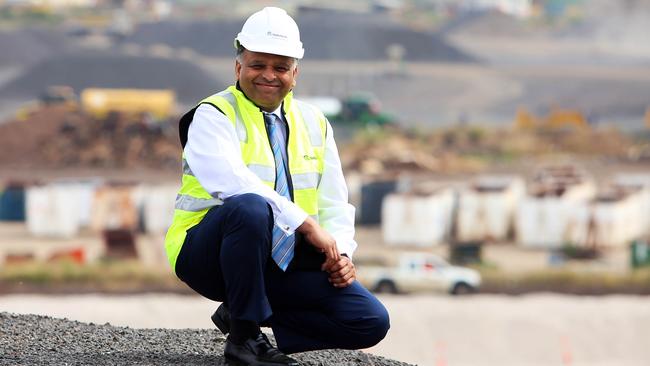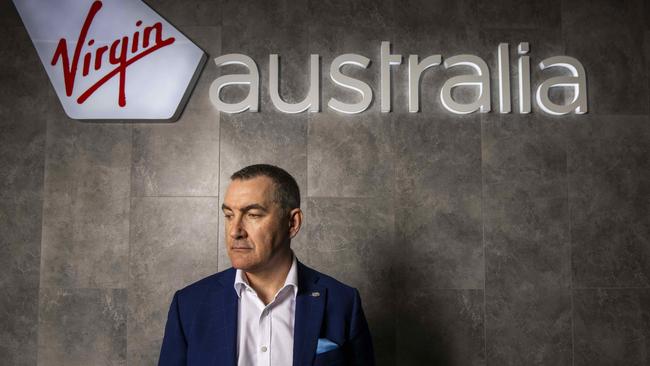‘It’s the Vik Bansal show’

Cleanaway boss Vik Bansal ’s excessive travel costs have been a cause for contemplation over the past few days, but Margin Call may just have got to the bottom of it.
Thinking time.
Bansal himself has previously described his flying time as best for quality thinking, saying it was “quite therapeutic” and akin to his time spent on the golfing green, where more thinking takes place.
Goodness knows he has plenty to think about.
“People say, how do you do a lot of time flying? It’s good for me, I find it quite therapeutic, in a strange way. It’s my ‘me time’,” he told a Blenheim Partners podcast last year.
“People come out of the plane quite tired, I come off the plane and feel quite energised.”
With a regular interstate commute between his home in Sydney and the company’s HQ in Melbourne costing the company $90,000 in the past year, and more than $440,000 in the past five, perhaps its time we started calling Bansal the Energizer Bunny.
The conversation with Blenheim’s Gregory Robinson sheds new light on his leadership style, after chairman Mark Chellew revealed issues with Bansal’s “overly assertive behaviour” on Monday.
Bansal said being a leader was a lonely position, and not for everyone, stressing that humility was the most important value for good leaders.
“Leaders set the tone of the company — I am the custodian of the values of the organisation, and humility is one of those.”
Detailing his early career he described his approach to initial management roles as “the Vik Bansal show”, where ambition was the driving force, but that as he had climbed the ranks he had become more ambitious for his team, and for the broader company.
Reflecting on his early career as a young manager: “It was all about me. The whole ambition was about Vik Bansal. I hadn’t achieved the self-awareness of thinking this is about team. This is about the people I hired”.
“The team was highly motivated. Everybody knew I was the Vik Bansal show. And that is not good leadership. That is not what I would do now”.
“In the early stages of my career...It was me, my ambition, it was my way or the highway”.
But Bansal’s leadership style has evolved.
“Values compatibility is so critical. I spend most of my time looking for leaders who are compatible with the culture — you can’t afford to have senior leaders who have not emotionally surrendered to the cause of the company.
“You should intellectually challenge ideas, concepts and direction, but once it has been agreed, if you can’t emotionally surrender to the cause, you are consistently letting the team down.”
Planes and thinking
On the subject of planes and thinking, Virgin chief Paul Scurrah certainly knows a lot about both and one thing on his mind of late has been job cuts.
He told a virtual conference on Thursday his biggest regret during the airline’s administration was dragging his feet on the announcement of staff redundancies.
“We could have got to them quicker. We thought we were preserving some hope for the employees but I think we took too long,” he told the Yahoo All Markets Summit.
Hindsight or not, those regrets haven’t stopped him from leaving more head office staff in limbo — earlier this week foreshadowing that up to 150 positions would go in a second round of redundancies after the workforce was cut by a third in the initial rescue plans laid out by new owner Bain Capital and its local chief Mike Murphy.

Scurrah said the plans were “all about survival”, shying away from questions as to his contact with fellow airline boss Alan Joyce.
Probed on who he looks up to, and whether he “calls up” rival Joyce for a chat, Scurrah said he “takes a lot from what he says publicly about the industry” adding both men had “reason to talk on a number of occasions” and had done that “quite effectively”.
Comments on Deloitte’s Vaughan Strawbridge came more easily: “I have experience leading a company as CEO but I had never guided a company through an administration. I leaned heavily on Vaughan and his colleagues at Deloitte to guide me through.”
The greatest praise however, was saved for former Westpac chief and one-time Olivia Newton-John co-star David Morgan, described as a “trusted mentor of mine”.
On his routine, Scurrah said his usual eight hours a night sleeping habits and exercise regime had taken a knock from the long hours during negotiations, adding his reliance on caffeine had stepped up a notch.
Shopping with Shaun
Let us take a moment to appreciate the lengths our thankless analysts go to for deep analysis.
None more so than JPMorgan’s top retail analyst Shaun Cousins, who this weekend traipsed all the way to Western Sydney for his latest edition of “Shopping with Shaun”.
No, its not a midday infomercial, nor grocery-grabbing game show, but rather, a deep dive into retail trends from the depths of suburbia, this time at Auburn, Greenacre and Chullora — the latter best known for “that” viral toilet paper fight during the height of the pandemic.
Armed only with a camera, an expense account backed by a Wall Street bank and his keen eye for customer insights, Cousins braved the Hume Highway to gather material from not one but four listed entities, including Gerry Harvey’s Harvey Norman, the Richard Murray-led JB Hi-Fi, and the supermarket giants led by Steven Cain and Brad Banducci.
In his tour de suburbs, Cousins provided such insights as online focus, newly refurbished stores but perhaps the most controversial was his assertion that the Woolworths Ooshies appeared to be more effective than that of Coles’ Little Treehouse promotions.
Elsewhere, Cousins gave Woolworths Chullora a tick for an in-store robot used for cleaning. This was an “innovation and cost saving”. He also liked the trolley self-check-out option (but noted Chullora residents still favoured the staff check-outs).
Where Woolies falls short were the tickets used market items on shelves. Instead of paper they were sturdy plastic. While these were quicker to apply, Cousins insists they are less impactful given the smaller size and the fact that the consumer “is less aware of what the red-edged, yellow ticket, or white-edged shelf talkers mean”.
Its comments like that would have no doubt triggered a few sell orders from JPMorgan's institutional traders on Thursday.



To join the conversation, please log in. Don't have an account? Register
Join the conversation, you are commenting as Logout